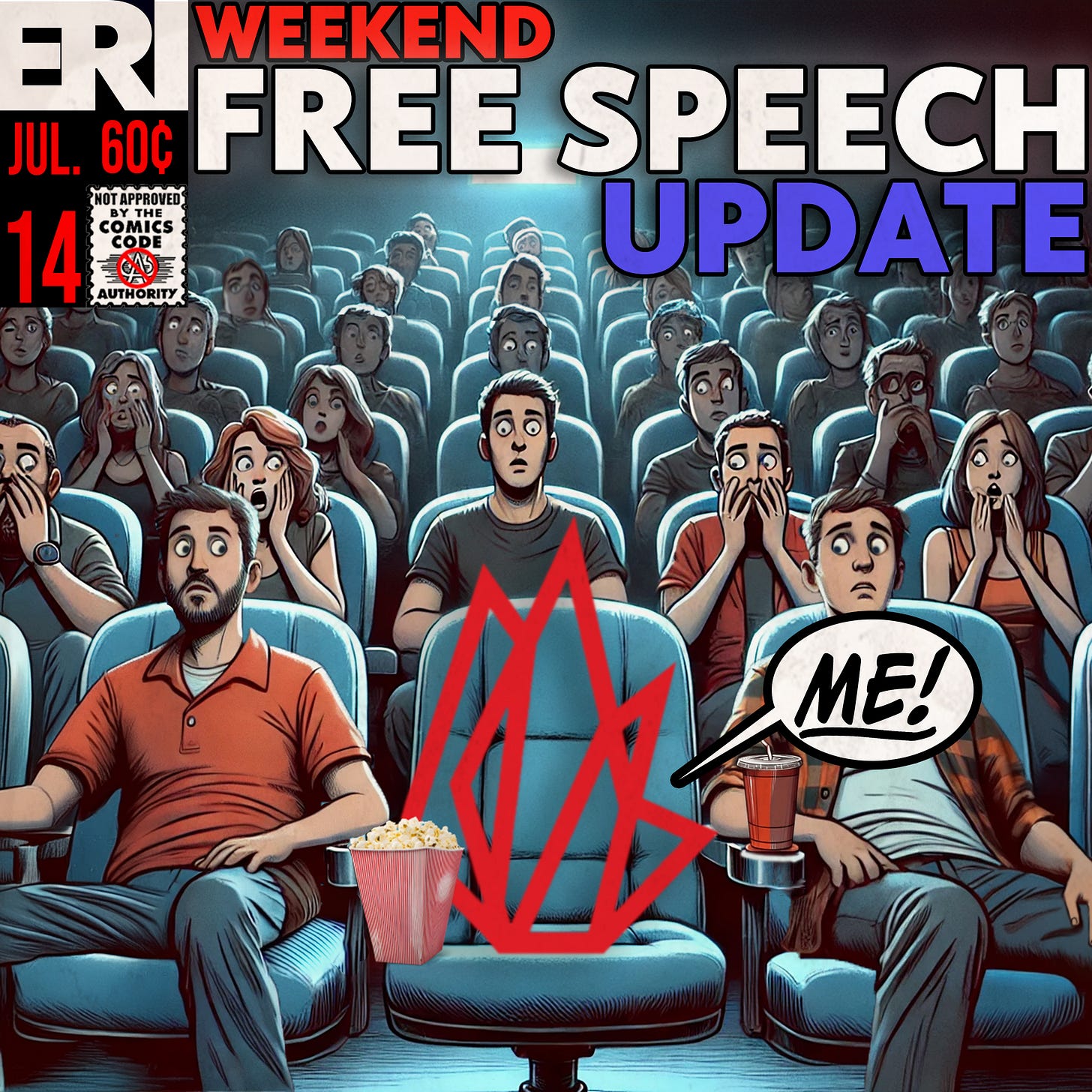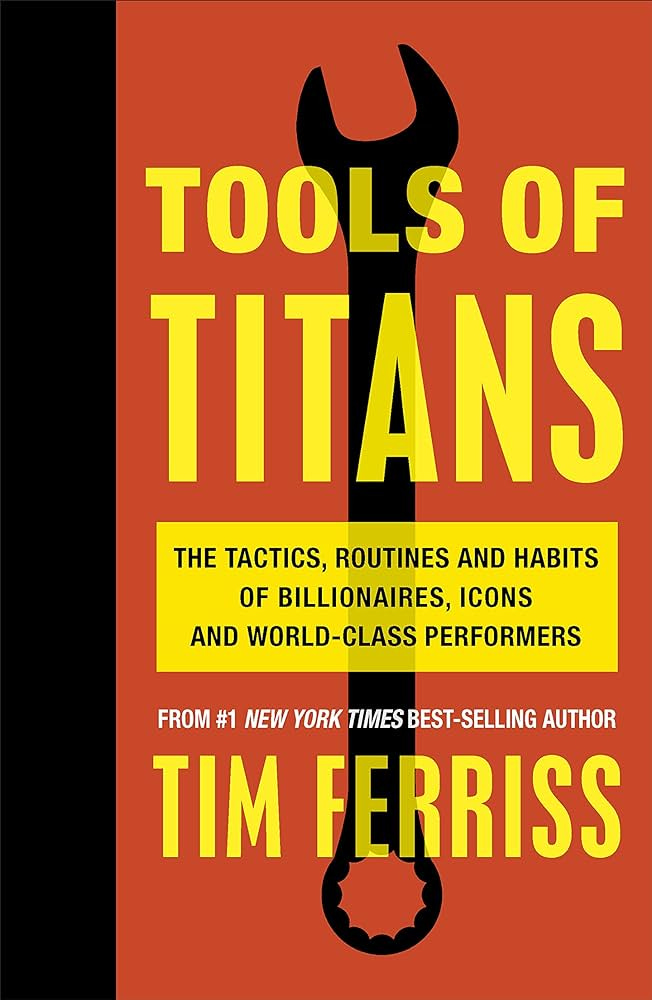SCOTUS keeps government out of the liquor cabinet & Tim Ferris shares the advice of titans
Bringing you the latest free speech news (7/14/2024)
Story of the week
Here’s how the Supreme Court got the big free speech stuff right (Fox News) by FIRE Chief Counsel Bob Corn-Revere
FIRE’s amicus brief paraphrased the late humorist P.J. O’Rourke to say that giving state legislatures power over social media moderation decisions "is like giving whiskey and car keys to teenage boys." Last week’s Supreme Court decision promises to take away the keys and lock the bottles in the liquor cabinet.
This week in ERI
The First Amendment ISN'T out of control by Greg Lukianoff and Adam Goldstein
Those who argue against a strong interpretation of the First Amendment elide the fact that theirs is not merely an abstract argument about the limits of free speech, but an argument for the government to have more power. The founders carefully limited government power (through checks and balances, the separation of powers, and a specifically enumerated Bill of Rights) because they understood human beings’ self-serving biases long before that term was popularized on campus.
Anti-Semitism is a real problem — but the Antisemitism Awareness Act is unconstitutional by Greg Lukianoff
Nobody who wants to see anti-Semitism addressed should support this Act. It likely won’t survive first contact with a federal court, and is therefore no solution at all. As we have repeated many times, when you want to address a real problem, step number one is to pass a solution that won't be immediately thrown out by a court.
This week in FIRE’s blog
In a blockbuster First Amendment term, the Supreme Court got the big stuff right by Angel Eduardo & Ronnie London
This term, the Supreme Court heard eight First Amendment-related cases. The Justices ruled on some cases and side-stepped the ultimate merits in others — but the term still provided important takeaways for Americans’ free speech rights. Here are five big things you should know about the Court’s First Amendment decisions.
Surveys reveal rising student and faculty concern about censorship, self-censorship post-October 7 by Emily Nayyer
Censorship and self-censorship, whether they’re driven by administrators, peers, or politicians, is detrimental to the quality of American education. Students and scholars must be willing to express their ideas, debate controversial issues, and research complex topics if colleges and universities are to effectively examine and disseminate knowledge.
Groups across ideological spectrum unite in opposing Antisemitism Awareness Act by Sofia Lopez
Introduced by Rep. Mike Lawler in 2023, the Antisemitism Awareness Act requires the U.S. Department of Education to use the International Holocaust Remembrance Alliance’s working definition and contemporary examples of anti-Semitism when enforcing anti-discrimination laws on college campuses. But the IHRA definition was never intended to be used for legal purposes, and it covers a broad swath of expression the First Amendment protects.
University of Florida suspends student for three years over peaceful protest by Jessie Appleby
The hearing boards overseeing the conduct hearings of the other students arrested at the April 29 protest also rendered mixed verdicts and recommended sanctions far less onerous than a three-year suspension. Yet in each case, [dean of students Chris] Summerlin rejected the hearing board’s determination and recommended sanction, finding the students responsible for all charges brought against them and imposing a minimum suspension of three years.
This week on ‘So to Speak’
FIRE Monthly Member Webinar — July 2024 (membership required). On this month’s webinar, we take your questions and discuss the big takeaways from this year’s First Amendment cases at the Supreme Court. Joining FIRE executive vice president Nico Perrino are legal director Will Creeley and general counsel Ronnie London.
‘Canceling’ in the news
Greg joined the The Puck: Venture Capital and Beyond podcast to talk about tech, media, and culture.
International free speech story of the week
Welsh government commits to making lying in politics illegal (The Guardian) by Steven Morris
[Welsh government general counsel Mick Antoniw] said: “The Welsh government will bring forward legislation before 2026 for the disqualification of members and candidates found guilty of deliberate deception through an independent judicial process.”
Antoniw said the practical details of how a law to tackle lying would work would need to be worked out and he called for cross-party cooperation.
London Calling: Ronnie’s First Amendment Rundown
Here’s a case that raised concern about the vitality of protesters’ First Amendment rights, through the specter that protest leaders – or even participants – could face responsibility for unlawful and/or harmful acts of other participants. But after several Fifth Circuit decisions and a quick trip to the Supreme Court, this week the trial court granted summary judgment rejecting the claims of Baton Rouge police officer Ford, who got hit in the face with piece of concrete while on duty at a protest, and in favor of Mckesson, whom Ford claimed should be liable for his injuries. The court held Ford produced no evidence Mckesson arranged for protesters to meet, or to block entry or access to anywhere, or that he was directing them, planned the protest, or was in charge of the protests, or gave directions at them, nor that he incited violence or criminal conduct. It also held that the First Amendment bars the claims under the Supreme Court’s Counterman v. Colorado decision, which the Court decided just days after the Fifth Circuit ruled. Just like FIRE has explained, and had advocated to the Supreme Court.
Book of the month
The recipient of the Prestigious Ashurbanipal (Book) Award for July is Tim Ferriss’ book “Tools of Titans: The Tactics, Routines, and Habits of Billionaires, Icons, and World-Class Performers.” The book is a “greatest hits” of Ferriss’ podcast interviews with famous and/or extremely successful people.
I am somewhat self-conscious about this one, not only because the name of the book sounds so self-helpy and clickbaity, but also because of its very odd structure. Ferriss breaks the book into “healthy,” “wealthy,” and “wise” sections, which means that the best parts of the book are hidden at the end, and the opening part is an absolutely bizarre romp through the strange health and fitness world of Tim Ferriss, including acroyoga (!?), fasting retreats, exogenous ketones, beet root powders, hyperbaric chambers, homemade horror saunas, and learning to hold your breath for seven minutes for some reason.
But I recommend this book because much of the later stuff is so absolutely fantastic. Even simple reminders to look up to the sky when meditating, how to think about your finances, and, thanks in large part to Eric Weinstein, great wisdom on what’s wrong on campus and our conformist culture. Sam Harris shares great insight, Gabby Giffords’ goodness somehow just shines through, and Malcolm Gladwell vents about higher ed, saying:
The worst advice that, in general, we give in America is that we terrify high school kids about their college choices. All things related to college fall under the category of bad advice. As you will find out when you listen to my rants about college [on Revisionist History], I think the American college system needs to be blown up and they need to start over.
I will be listening to parts of this again and again for its wisdom and insight, including director Robert Rodriguez’s advice on how to incorporate creativity into your daily life and Tim Krieder’s spirited defense of the value of being lazy. I also deeply appreciate Tim Ferriss being open and honest about his experiences with depression and contemplating suicide. I’m glad more people are doing that. It’s important for people to know that a lot of us have confronted that at one time or another.









Now that the Supreme Court decisions are made, legislators can draft new “Supreme Court-proof” policy. Here’s an idea - what do you think?
Social Media algorithms have “learned” that hate speech, and negative words make money for the company. That technology could be programmed to balance for hate and negativity by searching for and amplifying counterpoints which are underexposed, due to the bias in Social Media AI, based on a metric I call “real time reach”.
To incentivize balance, the Social Media companies should report results for issues exceeding a “real time reach” of 15% to the FCC. When balance is not achieved, the Social Media Company will not be protected by the Section 230 liability exemption for related damages.
Having worked in media that is not exempt from liability, in my experience, fear of liability creates a culture that isn’t “moving fast and breaking things”.